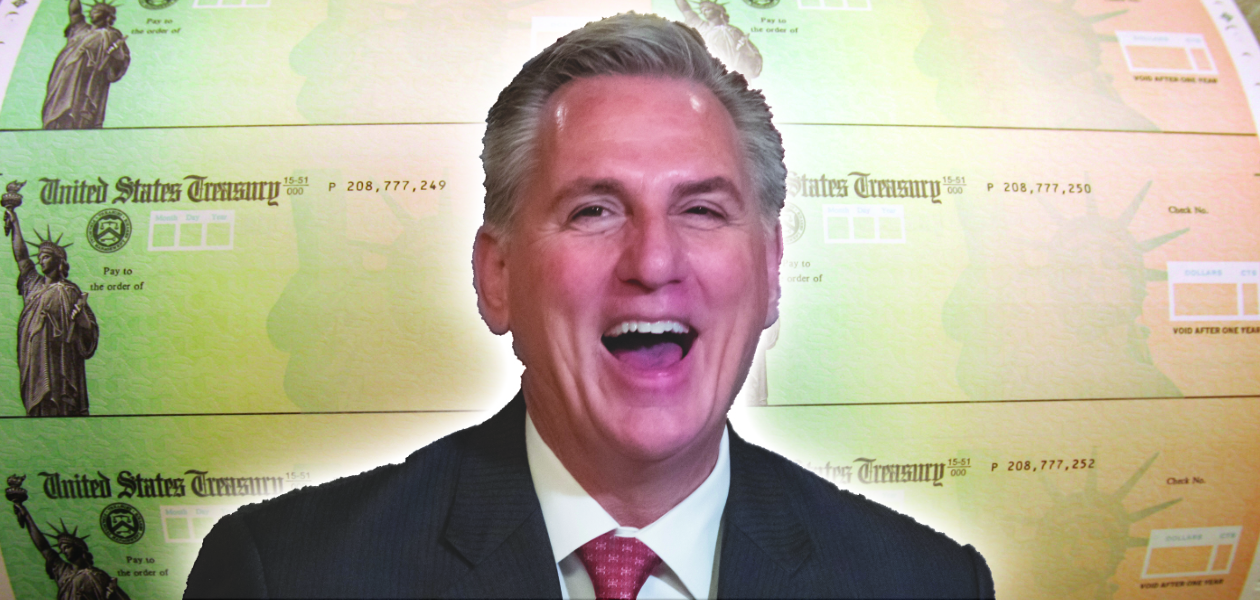
WASHINGTON—Recent reports indicate that the debt limit “X-date” could come as early as June 1. On this X-date, the U.S. Treasury will no longer have enough cash in its accounts at the Federal Reserve to meet all the legal spending obligations legislated by Congress. These obligations include paying holders of U.S. Treasury debt, Social Security checks, and reimbursements to doctors treating patients covered by Medicare and Medicaid.
The normal way of dealing with such a cash shortfall—selling new debt issues and depositing the proceeds into the Treasury’s account—is exactly what the debt limit will make impossible on that date.
If the X-date comes and nothing is done except the federal government fails to fulfill its spending obligations, economic calamity will ensue: People who depend on programs like Social Security and food stamps will suffer, and the spillover effects on the larger economy would certainly cause a recession—and a truly horrible one if the stalemate lasted for any significant amount of time.
The factor forcing this terrible outcome would not be any implacable economic reality, it would simply be Congressional Republicans weaponizing the absurd political institution that is a statutory debt limit that can only be adjusted through acts of Congress.
With a responsible Congress, the debt limit would be a silly inconvenience to policymaking. But twice in the past 12 years, Republican-led efforts in Congress have brought the nation to a near-crisis—and the current near-crisis could still graduate into a real crisis in coming weeks.
In 2011 (the last instance of protracted debt limit brinkmanship), the GOP demands for large spending cuts did mammoth damage to the living standards of U.S. families by sabotaging the economic recovery from the Great Recession and financial crisis of 2008–09.
This time around, the GOP demands are not just for recovery-damaging spending cuts, but also for a complete do-over on already passed legislation. Republican Speaker Kevin McCarthy’s recently released list of demands includes rolling back student debt relief as well as the Inflation Reduction Act’s (IRA) climate provisions and enhanced enforcement against the nation’s rich tax cheats.
The cuts to IRA climate provisions would be literally catastrophic—the act’s climate provisions are the only thing keeping the U.S. economy on a path of needed emissions reductions to contain the worst damages of climate change. Further, hundreds of billions of dollars of planned private investment have already begun based on the incentives provided in the IRA. Stripping these climate provisions away would snap the economy back to a path toward climate catastrophe and be a huge waste of society’s resources.
All of this clearly calls for abolishing the debt limit to keep irresponsible Congressional majorities from holding the nation’s economy hostage to its policy preferences in the future.
But what makes today’s debt limit showdown so bad is how normalized it has become—often with the encouragement of too many in D.C. policymaking circles who should know better. Many institutions and people who had argued forcefully in the past that the debt limit should not be wielded to force policy concessions—from business lobbies to former Treasury Secretaries to bipartisan think tanks—have instead this time blessed the absurdly shallow “deal” put forward by McCarthy.
If this drive to normalize debt limit brinkmanship does not spark an economic meltdown this time, we all know where it leads next time.
This makes it imperative that the Biden administration does whatever it takes to keep the debt limit from binding our nation’s economy. Their negotiations with McCarthy cannot include spending cuts or special legislative processes that make it easier to enact cuts going forward (no supercommittees).
Some defenders of the debt limit claim that it is good because it forces Congress to “reflect” on the nation’s fiscal trajectory. Former Trump administration budget director Mick Mulvaney made this claim about how the debt limit should be treated: “…the debt ceiling is really that buzzer that goes off when your battery is busted in your smoke alarm. It always goes off at an inconvenient time, it is always a pain to change it, but you always do it.”
This analogy is predictably terrible as a description of the real world. A faulty battery in a smoke detector can’t burn your house down. The debt limit could.
If the Speaker doesn’t agree to raising the limit, the administration should use the range of accounting and legal workarounds available to them to keep the debt limit from binding the country.
These are all suboptimal relative to debt ceiling abolition in the short run, but in the long run they will end up implicitly codified (unless the Supreme Court wants to take responsibility for forcing an unnecessary economic crisis) and will take the prospect of a debt limit crisis off the table of future presidents and Congresses. This would be a huge gift to the future.
As with all op-eds published by People’s World, this article reflects the opinions of its authors. Their column, in a slightly longer form, originally appeared on the blog of the Economic Policy Institute.
We hope you appreciated this article. At People’s World, we believe news and information should be free and accessible to all, but we need your help. Our journalism is free of corporate influence and paywalls because we are totally reader-supported. Only you, our readers and supporters, make this possible. If you enjoy reading People’s World and the stories we bring you, please support our work by donating or becoming a monthly sustainer today. Thank you!













Comments